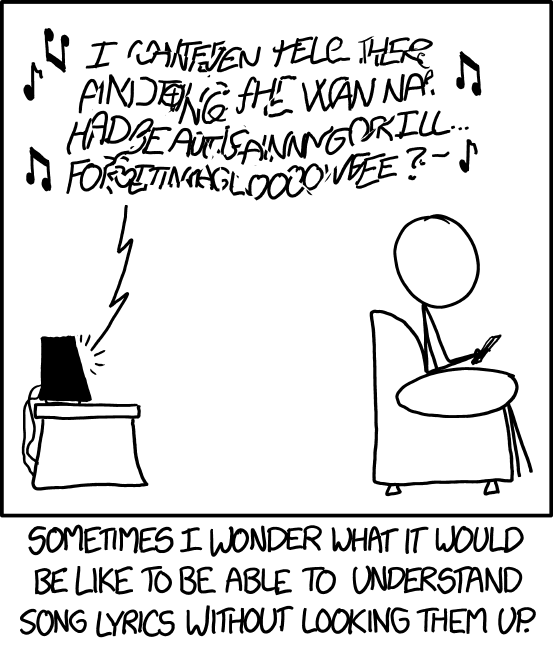Everyone seems so good at English so I wondered how many people learned it to such proficiency and how many are just natives
I feel like non native users are often better at both formulating themselves and spelling, compared to many native speakers
Especially the part where people replace ‘have’ with ‘of’. (Would of instead of would have / would’ve)
Non native speaker here too btw
Oh boy, I got so confused when I was a beginner and some American kid told me “would of” is an alternative to “would have”
There are a lot of regional things as well as slang that aren’t universal between native english speakers. Your confusion is kinda like how some new drivers can be better than veteran drivers because the information is still fresh and they haven’t developed bad habits yet. Even as a native speaker, you’ll sometimes be confused with terminology from other areas.
Examples would be stuff like “fanny” meaning something different in north America compared to Britain. “Cunt” is a lot less offensive in Australia than America. “Bless your heart” is slightly more insulting in the south than the rest of the states. Calling someone “buddy” is friendlier in Canada than the states etc.
I think the “proper” way to simplify it is would’ve, which is pronounced the same as ‘would of’
A lot of mistakes have just become incorporated into the language in the past. Maybe ‘would of’ is just too blatantly wrong for that to ever happen though
Maybe not really a ‘mistake’, more of a normal shortening but my personal favorite english-ism is “bye” being descended directly from “god be with you”. People just kept collapsing it more and more over time.
Edit: also “a pease” -> “peas” -> “a pea”
Also literally… If can both mean exactly something or be used for emphasis

“i did it on accident” blows my mind. It’s by accident, not on accident.
I always cringe when I see native speakers confuse “it’s” and “its”, “their”, “they’re” and “there” and all the other subtleties of their language. But then again, I’m a pedantic German and maybe Americans are so anti-education already that they’re cool with that.
although its incorrect, i’d say their are better things to worry about
Wouldnt your “their” be actually “there”?
Woosh
r/wooooshwith4os
Well native speakers learn the pronunciation first, so it’s harder for them to distinguish between different forms of the same sound combination
I learned the basics from Sonic the Hedgehog and Streets of Rage. Ready… Start! Time up! Game over! Marble zone! All useful phrases when abroad.
For me it was honestly Minecraft since the translations weren’t a thing for a while after its first release (in combination with school)
I just spend too much time on the internet
Yup same here
I learnt it since I was 3. I was literally forced to do it instead of playing outside with my friends. And always out was hard…
Then I found the language Esperanto, that is supposed to be 10x easier to learn and use. I tried it and I can conform that to be true 😊
But I needed English for my (volunteer) work in a social movement, so I slowly learn it. But still had big problems to understand spoken English. Then I found English videos about topic that was very investing for me. I was trying hard to understand and finally I did.
Long story short, I still prefer to speak Esperanto, and much more people should, IMO.
Oh wow, it’s so cool you speak Esperanto! Can you share your experience with it? Where do you use it? What good Esperanto communities are there? Do you find it actually useful? In what ways did it enrich your life?
I’m also in the process of learning Esperanto (there’s actually a decent amount of us on Lemmy)
I don’t foresee it ever being particularly useful on its own, but it is a really easy language to learn, and I think it’s a great way to learn how to learn languages. I feel like after casually teaching myself it for a few years I’m a lot better prepared to learn another language somewhere down the road
There’s a few Esperanto clubs and such out there, I’m not a part of any of them so I can’t really comment on the community all that much.
One thing that does kind of interest me is Pasporta Servo, which is sort of a free Airbnb/couchsurfing thing for esperantists. Seems like that could be a cool way to travel around on the cheap and probably a good way to get more involved in the Esperanto community. Unfortunately most of my traveling is done with my wife and I haven’t been able to convince her to learn Esperanto with me so I doubt she’s gonna want to go hang out with me chatting with someone in a made up language in a foreign land.
Mostly I talk to my dog in it. She knows most of her basic commands in both English and Esperanto.
in a made up language
Aren’t all languages made up?
Constructed vs evolved.
Yes, all languages are made up. But some are more made up :-)
BTW a lot of open source programs have Esperanto translations (including Lemmy). Facebook does also for some reason.
One of the reasons that I love free / libre / open source is its high acceptance of Esperanto as an interface language. I myself also helped translate bunch of them (now I am searching for money to pay others to translate them :).
Facebook had a program of volunteer translations years ago. I helped a bit by rating existing translations. Then some law came that prevented for-profit corporations to use volunteers as translators and the program was shut down. Similar with Google, who still has parts of interface in Esperanto. Rumors go that Gmail was once fully translated into Esperanto, but the political decision went to not deploy it…
Heh, I am pretty deep embedded in the Esperanto community. I have started 18 years ago and during that time made a lot of friends, some enemies, some love partners (really, we talk together in Esperanto!). In fact, I have founded a nonprofit nongovernmental organisation that support volunteers to write better Wikipedia in Esperanto - and I love the work and it even pays me sometimes. And because of my activities, I have travel around the planet. I live in Europe, and once I have traveled in one month to Seoul, South Korea and Benin and Togo in Africa to Esperanto meetings. That was crazy! During that month I have fulfilled my 2 childhood dreams - to climb a bamboo and to eat a sugar cane ;-)
So, yeah, it enriched my life pretty drastically. I would say that the the biggest long term benefit that I get was wast widening of my horizons. The world became “smaller” for me / more of it became “my home” and I have become more “world citizen”. It may sound cheese but it feels great :-)
There are many local groups over the planet, some event practically every day, many Telegram groups with pretty active community. On Lemmy, there is mostly !esperanto@sopuli.xyz
Very inspiring! I think you convinced me to give it a good try. Thanks for your story and the links!
Cool. For learning Esperanto there is a great site https://lernu.net/ and also Duolingo, and others. After some time came back and comment about your progress, I am interested in your story 😉
Thanks! If I don’t lose Internet access which can happen where I live, I’ll definitely come back XD
For spoken English, I greatly recommend audiobooks and podcasts. They typically have better narrators, so are easier to understand. As a bonus, one can listen to them while doing household chores and such — for me, consumption of books greatly increased with audiobooks compared to snatches of books here and there.
Absolutely! The videos that helped me to understand English was podcast-like. I am a big fan of audiobooks and podcasts. Mostly to give some rest to my eyes, and to consume them while I am walking outside to protect my physical health.
I’m Russian, I started learning (school doesn’t count) chatting playing pool at Yahoo.games in the beginning of 2000s.
Then I stopped getting translated versions of games (when I got Morrowind, my head literally hurt due to the amount of “foreign” texts I had to read). So, Internet and games taught me in the beginning.
Then, I was asked to translate at business meetings in my (quite small) company, I did some contract translations as well.
Then I got into IT (like 2012 or so), where you use English in many situations. In 2019, I got into an international company, where I spoke English as a main language for three years. Along the way I moved to Denmark, so now, in addition to my kinda broken English, I have a really shitty Danish.in addition to my kinda broken English, I have a really shitty Danish
Thankfully, not much difference between those, eh.
I learned english because i’m deaf and french subtitles were scarse. Futhermore, i always wanted to read the latest scans :)
German here.
Basically 80-90% of my media consumption is in English.
I search (mostly) in English, read documentation in English and document my own stuff in a mix of English and German (we call this Denglisch in Germany (compound of (D)eutsch+Englisch)I’m Dutch, but due to the large amount of English content I never really had an issue with English. While I struggled with German and Fr*nch, I never had to pay attention or study for English lessons. I just did what felt natural and ignored the homework etc. Not that I’m a great English speaker or anything, my vocabulary is sometimes a bit limited which makes me have to search for the right words to use. But when watching or reading I can follow pretty much anything. I also sometimes feel like I’m more resilient to accents than native English speakers, maybe because we get exposed to British and American English and therefore kinda learn a more generalized representation of the language? Idk, maybe that’s not a thing
A bit of the same boat (minus the 3rd lang. Am only bilingual).
My struggle is primarily switching and mainting the speed but also the vocabulary at hand. And I feel more pressured while talking than writing.I like to think I learned most of my English from watching nickelodeon past eight. Watching drake&josh, iCarly, the Simpsons and Southpark with Dutch subtitles on was a big part of me when I was younger.
I’m a non-native English speaker, learned it by watching cartoons without subtitles when I was a wee little squirt
I also learned from TV, mainly Friends, Scrubs, Family Guy, and similar, with and without subtitles. Then had a gf/wife for twelve years who was native English speaking from across the pond.
I’m good with math and music, and such people tend to also pick up languages easily, or so I’ve understood. I would say I speak and write at a native level though thanks to being with that woman for so many years and communicating with her in English, and doing daily communication online in English for decades now.
Also having a curiosity where I look up words I don’t know, or when I see new words. And I’m interested in a lot of fields where there’s a lot of advanced lingo which also helps. People I listen to are well spoken and good with words, which inspires me.
So I guess all these things combined made me quite proficient. 🤷♂️
I’m from Spain and English is my third language (currently trying to learn Portuguese)
I’ve learn it with music (Judas Priest🤟), movies and series.
For some reason, learning through music is really hard for me. I have zero issues talking and listening to English speakers for years now, but I still have to actively listen if I want to get 100% of some song.
As a native English speaker I certainly won’t process the words of a lot of songs without a conscious effort
Lyrics are so often indecipherable as well. https://m.youtube.com/watch?v=jGLYJQJh9c8
One that I remember is that I had heard the song “believer” a number of times before learning its name, I always thought they were saying “pick me up and pick me up and leave me, and leave me”. I don’t think I even tried to decypher the rest lol
Not just you:

This is so true… Like I literally can’t understand lyrics even in my native language
Same here, I tend to pay attention to the melody rather than any of the lyrics unless I actively try otherwise.
3rd here too and have been casually learning Turkish, Chinese and Spanish with friends.
I’m German. Back in my day, we had 9 years of English classes in school and from what I’ve heard it’s even more now. I was lucky to have a teacher who had spent a couple of years in the UK so he had much less of a German accent than most other teachers at our school and was also able to give us a lot of insight into how people actually speak, compared to the rather formal and stilted examples in our textbooks.
Between social media, movies, shows and a job in software engineering, I would say that on most days I read and listen to more English than German.
So many people from Germany here on Lemmy! I wonder why that is. Maybe free software movement is a bit more popular there? There seem to be so many good German open-source projects!
I’m from germany. I watch a lot of YouTube. Also I work as software developer, so I need to read many english manuals. Wich don’t means, that my english is great. But it could also be worse.
I had a lot of friends from germany and i was a little bit shocked that they didn’t speak a second language. They all kinda understood english on a surface level, but not that great. Has that changed?
Depends on the community.
I had one that claimed to be able to read but not speak English.
Everyone else was able to do both to some degree.But that experience comes from a school where everyone trained for an IT related job.
I won’t say that. I’ve born '95 and i had english lessions since 3rd class. My “little” cousin (born 2001) had english lessions even in kindergarten. However, it may depend on the school type you’re going to. Also it depends on how you’re using your skills after school. I at least read and listen a lot to english. However, I never actually speak it, so my pronunciation is really bad 😅 Others may use their english skills more often - or not at all.
I am Nepali. I am probably the only Nepali using such obscure platform. And I say it proudly to others. They think I am ninja, and ignore me. 😝
Not a native speaker. I learned mostly from American TV and reading Internet discussions. I have also absorbed a lot of more technical language through the native speakers at work. I made sure my coworkers know that I want them to correct my English, and working with a bunch of pedantic nerds, I sure get a lot of helpful corrections!













